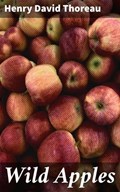In 'Wild Apples' by Henry David Thoreau, the author explores the beauty and significance of apples in nature, touching on themes of simplicity, self-reliance, and the interconnectedness of all living things. Thoreau's writing style in this book is reflective and philosophical, as he delves into the cultural and historical importance of wild apples, weaving in personal anecdotes and observations from his time spent in nature. The book is considered a classic example of American nature writing, blending scientific knowledge with lyrical prose. Thoreau's deep appreciation for the natural world shines through in every page, making 'Wild Apples' a thought-provoking read for anyone interested in the intersection between humanity and the environment. Henry David Thoreau, known for his transcendentalist beliefs and nature writings, drew inspiration from his own experiences living in the woods near Walden Pond. His keen observations of the natural world and his fervent advocacy for environmental conservation are evident in his works, including 'Wild Apples.' Thoreau's deep connection to nature informs his writing, making his insights both timeless and relevant in today's context of environmental awareness. I highly recommend 'Wild Apples' to readers who appreciate lyrical nature writing and philosophical reflections on the natural world. Thoreau's poignant observations and timeless wisdom make this book a must-read for anyone seeking to deepen their understanding of humanity's relationship with the environment.

